
Airchecks: 1971
Talent: TOM RIVERS
Station: CHUM Toronto
Date: January
1, 1971
Time: 47:38
(unscoped)
12:47
(scoped)
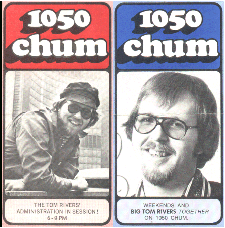
The story of CHUM's year-end charts is a rich and important part of the history of the Top 40 radio pioneer.
CHUM began publishing weekly charts right
from its beginning as a Top 40 station on May 27, 1957. However,
it didn't publish a year-end list until January 13, 1964, with
the Top 63 of '63. CHUM did broadcast the top hits of
the previous year in countdown form on New Year's Day in prior
years, but if you wanted a list, you had to listen and write them
down.
From the Top 63 of '63 to the Top 67 of '67, the year-end survey
appeared in the CHUM Chart. In 1968 and 1969, however,
the year-end chart became a Top 100 list, available only by
sending in a stamped, self-addressed envelope to CHUM.
Starting with the Top 100 of 1970, the year-end survey was
published in a Toronto newspaper. That practice continued right
up until the final list, the Top 100 of 1985 (CHUM abandoned
its Top 40 format for soft-rock in June, 1986, so there was no
1986 survey). It should be noted that the year-end list format
changed from a Top 100 in the early '80s, to the Top 82 of '82,
the Top 83 of '83, and the Top 84 of '84.
All of these countdowns were broadcast on CHUM, sometimes
live, sometimes taped. On January 1, 1971, Tom Rivers was
counting down the Top 100 of 1970.
Hear Tom Rivers (UNSCOPED) here. ![]()
Hear Tom Rivers (SCOPED) here. ![]()
(The Gary J. Peterson and Donald Major Collections)
Thanks to Marc Denis for his superb audio editing!
Talent: CHUCK DUNAWAY
Station: WIXY Cleveland
Date: January 1, 1971
Time: 44:23
(unscoped)
12:55
(scoped)
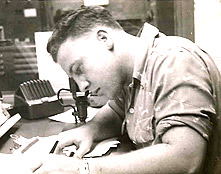
Some jocks are born to do the morning show.
Chuck Dunaway owned afternoon drive.
The entertaining jock worked the all-important afternoon drive shift at nearly every major station he jocked at: KILT Houston,KLIF-AM Dallas, WKY Oklahoma City, WABC New York (where he worked nights) and WKYC and WIXY Cleveland.
When he was done with jocking, Dunaway moved into ownership, owning and operating six FM and two AM stations in Joplin, Missouri.
Dunaway, who got started in radio with a weekly show at KLVL Houston in 1952, eventually graduated to the biggest market in the U.S. - New York City. He was the night-time jock at WABC when that station joined the Top 40 wars in December, 1960. Disillusioned with the station's wide playlist, he returned briefly to his old stomping grounds at WKY, then moved into programming at KBOX Dallas. But before long he was back in his familiar afternoon drive slot at KLIF, before moving downstate to the same shift at KILT.
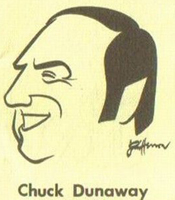
After KILT, Dunaway moved to Cleveland in the latter half of the '60s and did afternoon drive at WKYC and WIXY, then moved to a couple of stations in Austin, Texas. After that, Dunaway went into radio management and ownership.
Dunaway has been inducted into both the Texas Radio Hall of Fame and the Radio-Television Hall of Fame in Ohio.
(Just an observation, but the teletype effects on this aircheck seem to be outdated to me. This was 1971, and the teletypes were a '60s thing, though teletypes were still in wide use in newsrooms at the time.)
Enjoy Chuck Dunaway on WIXY (UNSCOPED) here. ![]()
Enjoy Chuck Dunaway on WIXY (SCOPED) here. ![]()
(The Joe Fazio Collection)
Talent: CKLW composite
Station: CKLW Windsor,
Ont.
Date: Mostly
1970s
Time: 14:36
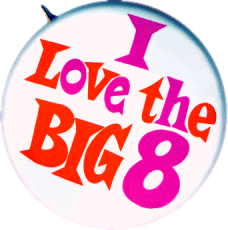
What
really made CKLW such a great station? Was it the tight
production, the bright formatics, the music or the personalities?
In truth, it was really a combination of all four elements plus a
few more. But to this corner, it was the personalities that
really gave 'CK the edge.
On this aircheck, you'll hear a collage of many of the great CKLW voices, including (in order) Byron McGregor, Tom Rivers, Charlie Fox, Jim Jackson, Hal Martin, Johnny Williams, Charlie Van Dyke, Frank Brodie, Jim Edwards, Bill Gable, Chuck McKay, Max Kinkle, Pat Holiday, Ted "The Bear" Richards and Mike Kelly.
You'll also hear Tom Shannon singing Paul Anka's Diana (I kid you not!) and the tape wraps up with a clip of Charlie O'Brien. Also, there are a couple of celebrity appearances from Elton John (as E.J. the D.J.) and Cheech and Chong.
Enjoy the CKLW composite here. ![]()
(The Don Shuttleworth Collection)
For more great 'CK airchecks, visit The CKLW Years
Subject: EARLY '70s JOCK
MONTAGE
Stations: Various
Date: Various
Time: 30:45
Lots of jocks, lots of rock.
Twenty-five jocks from all over the U.S. and Canada are included in this great deejay montage from the early '70s, when Top 40 AM radio was still going strong.
In order, here's who you'll hear:
|
Enjoy this montage
of early '70s jocks here.![]()
(The Bill Dulmage
Collection)
Talent: CHARLIE TUNA
Station: KHJ Los Angeles
Date: January 7, 1971
Time: 1:00:30 (unscoped)
19:06
(scoped)
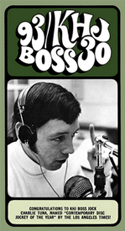
Charlie Tuna appears on this KHJ chart from Jan. 6, 1971
It's radio's greatest fish story, but unlike most fish stories, this is true.
Born April 18, 1944 in Kearney, Nebraska, Art Ferguson became Charlie Tuna at KOMA Oklahoma City in 1966 when Chuck Riley - who used the moniker for just one show - left the station. The rest is Top 40 radio history. Tuna went on to star at WMEX Boston, KCBQ San Diego and Los Angeles stations KHJ, KROQ-AM, KKDJ, KIIS, KTNQ, KHTZ (later KBZT), KRLA, KCBS-FM, KODJ, KMPC, KIKF, KBIG and KRTH. Tuna, whose TV and radio syndication and voice credits could fill a phone book, was voted into the National Radio Hall of Fame in 2008.
Known for his quick wit, Tuna had the honour of replacing legendary KHJ morning man Robert W. Morgan when the latter went to WIND Chicago in 1970. The gig only lasted until Morgan returned to the Los Angeles station in 1972, but it was memorable and just another feather in Tuna's cap (fin?)
Charlie Tuna died
February 19, 2015. He was 80.
Enjoy Charlie
Tuna on KHJ (unscoped) here. ![]()
Enjoy Charlie
Tuna on KHJ (scoped) here. ![]()
(The Tom Howard Collection)
Talent: RUFUS COYOTE
Station: WYSL Buffalo, N.Y.
Date: February
5, 1971
Time: 34:36
(unscoped)
6:30 (scoped)
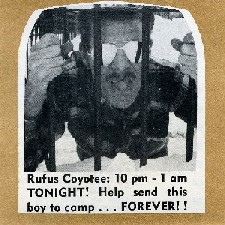
Wolfman Jack was never a regular on Buffalo radio, but Buffalonians had the next best thing. His name was Rufus Coyote, and he sounded remarkably like the Wolfman. Contributor John Bisci picks up the story from here...
"While Lee started out as Lee Poole, he developed a voice that was a tribute to Wolfman Jack. Lee's radio boss asked him to do the voice for the entire show. Thus Rufus Cayote was born. Lee started the Rufus alter ego in 1966 at KTKT Tucson, Arizona. His career started at KTKT,went to Dallas and KLIF,back to KTKT stopped in Buffalo for WYSL/WPHD, headed back to Dallas and KRLD. It was back to Buffalo for WGRQ and ended in Yuma, Arizona at KBLU. Lee is pursuing other interests and is out of radio at this time."
Enjoy Coyote on WYSL (UNSCOPED) here. ![]()
Enjoy Coyote on WYSL (SCOPED) here. ![]()
(The John Bisci Collection)
Talent: TOM KELLY
Station: CKRC Winnipeg
Date: February 15, 1971
Time: 59:29 (unscoped)

Can-Con changed Canadian radio forever.
One of the first mandates of the Canadian Radio-Television Commission (CRTC) when it was founded in 1968 was to find a way to get radio stations to play more Canadian music. Up until then, stations could play as little home-grown talent as they wanted. In most cases, it wasn't much.
Since stations were not about to voluntarily play more Canadian music, they had to be forced. So beginning January 18, 1971, at least 30 per cent of the music Canadian AM radio stations between the hours of 6 a.m. and midnight had to qualify as "Can-Con" (FM quotas came later).
Savvy programmers found ways to lighten the load. One trick was to play a lot of Can-Con in off-peak times, such as late at night or early morning on weekends (known as "Beaver Hours"). Another was to play edited or shortened versions of Canadian tunes. The CRTC eventually closed these loopholes, and in fact increased the percentage to 35 per cent in 1999. What's more, most new Canadian stations since the turn of the millennium have been licensed at 40 per cent (what better way to suck up the commission to get your license than to promise LOTS of Can-Con).
This aircheck gives us a listen to Canadian AM radio less than a month after the regulations were introduced. Fittingly, it starts with a Canadian tune.
Enjoy Tom Kelly on CKRC here. ![]()
(The Bill Dulmage Collection)
Talent: LEE BABY SIMMS
Station: KRLA Los Angeles
Date: March 30, 1971
Time: 34:38
(unscoped)
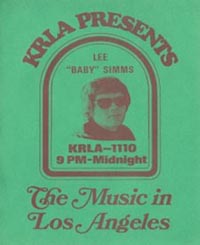
Lee Baby Simms was a true radio gypsy.
By his count, the man born Gilmore LaMar Simms worked at 35 stations in 22 markets and was fired 25 times because ``I never took an insult from anyone.`` He jocked as far north as WJBK Detroit, as far south as WMYQ Miami, as far east as WPOP Hartford and as far west as Honolulu at KKUA, KORL, KPOI and KDUK. In between, he appeared on biggies like WKYC Cleveland, KRLA Los Angeles, KCBQ San Diego, KOOL Phoenix and KYA San Francisco. Simms, who got his nickname from KONO PD Woody Roberts, also displayed his songwriting talents when he penned the lyrics for "Time" for the Pozo-Seco Singers in 1966.
Simms took his own life January 28, 2015. He was 72 and had been suffering from cancer.
Enjoy Lee "Baby" Simms on KRLA here. ![]()
(The Tom Howard Collection)
|
Talent: BOBBY STEELE
Station: CHLO London, Ont.
Date: April 17, 1971
Time: 20:50
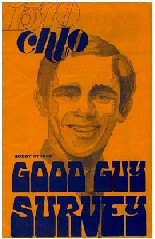
It's a Saturday night and CHLO "Good Guy" Bobby Steele is playing the hits from the "Music Line."
Yes kids, there was a time you could call a radio station, the DJ on duty would answer the phone and play your request.
Steele had lots of experience playing hits and taking requests at CHLO. He started at the St. Thomas station as a teenager in 1968, leaving three years later
for CFRA Ottawa. After stops at CKSL and CFPL London and CKOC Hamilton, Steele went into teaching in the early '80s.
Enjoy Bobby Steele at CHLO here. ![]()
(The Bill Dulmage Collection)
Talent: TOM RIVERS
Station: CHUM Toronto
Date: May 15, 1971
Time: 25:04
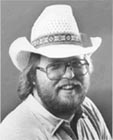
Much has been written and said about legendary Top 40 deejay Tom Rivers, who died of cancer November 20, 2004. We have gathered some of of those special memories here.
Tom Rivers was really COOKIN' the day this aircheck was recorded.
Hear Tom
Rivers at his very best here. ![]()
(The Charlie Ritenburg Collection)
For more great CHUM airchecks, visit The CHUM Archives
Talent: ART ROBERTS
Station: WCFL Chicago
Date: June 8, 1971
Time: 1:01:40 (UNSCOPED)
27:59 (SCOPED)
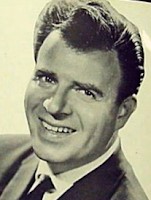
After a decade at WLS, Art Roberts moved to cross-town rival WCFL.
"The Cool Uncle" came to the Voice of Labour in June 1971 ironically to replace another WLS alumnus, Clark Weber.
Roberts enjoyed a radio career of four-and-a-half decades, from his first gig at KALT in Atlanta, Texas in 1953, to his final stop at KGVM Reno, Nevada in 1998. He suffered a stroke in 1999, and died three years later at the age of 70.
Enjoy Art Roberts on WCFL
(UNSCOPED) here. ![]()
Enjoy Art Roberts on WCFL
(SCOPED) here. ![]()
(The Don Shuttleworth Collection)
Talent: GIL HARRIS
Station: CHAM Hamilton, Ontario
Date: June 10, 1971
Time: 1:02:54
(unscoped)
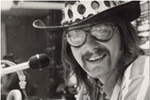
Doc Harris is one of those announcers who put a smile on your face every time you listened to him. His off-beat sense of humour and relaxed delivery charmed listeners for four decades starting in the mid-'60s.
The man born Gilbert Auchinleck started his career at CKDA/CFMS Victoria. Known on-air as Gil Harris, he was there from 1966 to 1969, then moved to CJAT Trail, B.C., from 1969 to 1970. CKOM in Saskatoon was his next stop in 1970. His next two gigs were in Ontario at CKSO Sudbury and CHAM in Hamilton. He was one of CFTR Toronto's first rock jocks - as Doc Holiday - in 1972.
In 1973, Holliday moved to Vancouver - changed his air name to Doc Harris - and began a long and successful career at stations like CKLG, CFMI-FM, CKKS, CKST, CKNW, CFUN and CISL.
Harris was one of the first radio personalities to get his own web site. His site at www.docharris.com has been on the web since 1994.
Enjoy Gil Harris on CHAM here. ![]()
(The Don Shuttleworth Collection)
|
Talent: JOHNNY MITCHELL
Station: KGB San Diego
Date: Spring, 1971
Time: 4:03
What's in a name? In rock radio, apparently a lot.
It's not unusual for deejays to go under two or more different names in a career. Dan Ingram called himself Rae Taylor in his early days. Bobby Ocean was Johnny Scott before the powers that be decreed a change of name.
Three or more names is less common. The man CFTR listeners remember as Red Knight called himself Jack London at CKLW and Rick Bradley at CKSL. Bob Dearborn of WLS and Nightime America fame was also known on-air as Bud Roberts and Mark Allen.
Canadian broadcast personality Howard Cogan went under FIVE names: his own, Todd Chase, Todd Howard, Howie the Hitman and Hungryman Howard.
It was also not uncommon for two deejays in different markets to have the same name at the same time. Back in the early 1970s, there was a Johnny Mitchell in Toronto on 1050 CHUM and there was also an announcer with the same name at KGB San Diego (better known as Eric Chase, a.k.a. Harry Miller and Paul Christy, writes Scrapbook viewer Barry Salberg).
You can hear Johnny
Mitchell here. ![]()
(Scrapbook archives)
Talent: TOM KELLY
Station: CKRC
Winnipeg
Date: June,
1971
Time: 46:09
(unscoped)
10:04 (scoped)

More Tom Kelly on the legendary CKRC!
Enjoy Tom Kelly on CKRC (UNSCOPED) here. ![]()
Enjoy Tom Kelly on CKRC (SCOPED) here. ![]()
(The Don Shuttleworth Collection)
|
Subject: JACK ARMSTRONG
INTERVIEW WITH JONATHAN WOLFERT
Station: N/A
Date: June 24, 1971 (Upgraded
3-17-12)
Time: 31:41
Jack Armstrong wasn't afraid to speak his mind.
In 1971, Jack Armstrong was interviewed by Jonathan Wolfert of PAMS about a number of radio topics including, memorably, his time at CHUM Toronto. This no-holds-barred interview tells the behind-the-scenes story of Armstrong's hiring at CHUM, that station's switch to the Drake format and Armstrong's departure from CHUM in early 1969. He also talks about several radio people, including Bill Drake, Dick Biondi and Cousin Brucie. (Note: the CHUM portion starts at 19:20).
Hear the Jack Armstrong interview here. ![]()
(NOTE: CONTAINS COARSE LANGUAGE)
(The John Bisci Collection)
AUDIO ENHANCEMENT by Andy Rebscher
Talent: TOM RIVERS
Station: CHUM Toronto
Date: July 2, 1971
Time: 23:04
A summer weekend, and Tom Rivers on CHUM. What more could you ask for!
Shortly after this show, Rivers left CHUM for a another rather famous station just down the 401, CKLW.
Hear Tom Rivers here. ![]()
(The Charlie Ritenburg Collection)
For more great CHUM airchecks, visit The CHUM Archives
Talent: HARRY
HARRISON
Station: WABC New York
Date: July 13,
1971
Time: 44:10
(unscoped)
22:49 (scoped)
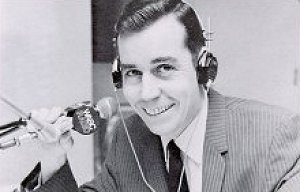
A native of the Windy City, Harry Harrison became a star in New York City.
Harrison, who had originally considered becoming a priest, got his start in radio at the age of 14, at WCFL Chicago, in 1953. Next stop was WPEO Peoria, Illinois, in 1954, where he was program director and also appeared on local TV. In 1959, he got his big break - as midday host at WMCA New York.
With his genial, non-combative style, Harrison was very popular at WMCA and in 1968 WABC and its program director Rick Sklar came calling. Herb Oscar Anderson was leaving and WABC needed a replacement. So for the first and only time, WABC "stole" a WMCA "Good Guy" and made him a WABC "All-American."
Harrison was WABC's "Morning Mayor" for 11 years, heading a lineup that included Ron Lundy, Dan Ingram, Chuck Leonard and - until 1974 - Cousin Brucie. In November 1979, Harrison, Leonard and Brucie's replacement George Michael were dismissed but Harrison wasn't out of work for long. In March of 1980 he replaced Jack Miller as morning man at WCBS-FM. Harrison stayed at 'CBS there for 25 years, before retiring from full-time duties in 2003 and weekend work two years later.
Harrison was inducted into the National Radio Hall of Fame in November 2019. He died just two months later - January 28, 2020 - at the age of 89.
Enjoy Harry Harrison on WABC here. (UNSCOPED) ![]()
Enjoy Harry Harrison on WABC here. (SCOPED) ![]()
(The Don Shuttleworth Collection)
Talent: ROBERT O.
SMITH
Station: KOL Seattle
Date: July, 1971
Time: 16:26

Thorndike Pickledish ... The Masked Avocado ... Dr. Zingrr ... Walter Mart the Freaky Frog ... Bench Bozo.
Top 40 jock, voice actor and power lifter Robert O. Smith was all of these and more.
Smith had a gift - the ability to do voices, lots of them. He appeared as a voice actor on countless anime and other cartoon series over the years. His television and film resume is astounding (view it here) as was his versatility - he once created 20 different voices for a single radio spot!
A natural Top 40 radio talent, Smith got his first on-air gig in 1966 at KAHI in Auburn, California. His first big-market gig was later that year at KLAV Las Vegas. By 1967, he was at KJR and KSND Seattle, which preceded a 1968-71 stay at KOL Seattle. Smith added KTAC Tacoma, Washington, and KVI Seattle to his resume in the '70s. He was at KIXI-FM Seattle in the early '80s, before crossing the border to British Columbia for gigs at CFMI-FM and CISL Vancouver, and CKMA Abbotsford, B.C.
Smith also had a notable career in the world of power lifting, with numerous records in the masters division of weightlifting competitions. He is credited with an official lift of 578.5 pounds.
Smith died May 30,
2010 of pancreatic and liver cancer. He was 67.
Enjoy Robert O.
Smith on KOL here. ![]()
(Courtesy Ted Wendland/radiowest.ca)
Be sure to visit radiowest.ca, a superb radio site hosted by Ted Wendland. Airchecks, jingles, photos, logos, history and forums - radiowest.ca has it all. Rock Radio Scrapbook thanks Ted for sharing this aircheck.
Talent: DON STEVENS
Station: CKLG
Vancouver
Date: July, 1971
Time: 3:16
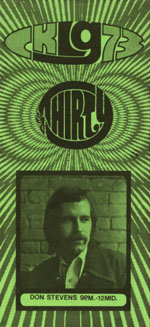
When Don Stevens began his radio career at CKSA Lloydminster, Alberta, in 1962, he could have hardly foreseen the changes that lay ahead in his business. Back then, jocks played music from turntables, had a say in the music that was played, and stations were live 24 hours a day, seven days a week for the most part. It was personality radio - what was between the songs mattered almost as much as the songs themselves (maybe more!). Nowadays, everything is digital and played from a computer (good), the jocks rarely have any say in the music (not so good), and much of the programming - especially at night and on weekends - is voice-tracked or there's no jock at all (ugh!). Progress? Something to contemplate.
After getting his career start at CKSA, Stevens went on to work at a number of major stations including CHED Edmonton, CKLG Vancouver, CJAY Calgary (as morning man and program director), and as program director at AM 106 (CFCN) Calgary, CKFM and CFTR Toronto. He was also morning show host at Lite 96 Calgary (CHFM) before moving to XL 103 (CFXL) in Calgary as program director and morning show host where he celebrated 50 years in broadcasting in 2012.
Enjoy Don Stevens on CKLG here. ![]()
(Courtesy Ted Wendland/radiowest.ca)
Be sure to visit radiowest.ca, a superb radio site hosted by Ted Wendland. Airchecks, jingles, photos, logos, history and forums - radiowest.ca has it all. Rock Radio Scrapbook thanks Ted for sharing this aircheck.
Talent: GUS GOSSERT
Station: WPIX-FM New York
Date: July 25, 1971
Time: 10:16
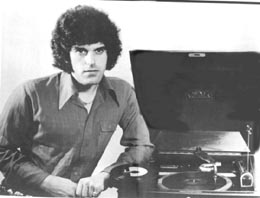
Back before oldies were "cool", there was Gus Gossert, "the curly-headed kid in the second row." The deejay who took his nickname from the legendary Peter Tripp ("the curly-headed kid in the second row") is credited with helping revive interest in New York street music - a.k.a. doo wop - in the late '60s and early '70s.
The Pennsylvania-born Gossert studied law at the University of Tennessee, but his true love was radio and doo-wop. After stops at stations in Hawaii and San Francisco, Gossert was hired by New York's WCBS-FM in 1969 to host a Sunday night oldies show - long before that station switched to an all-oldies format in 1972. Gossert's WCBS-FM show, which focused on doo wop music of the 1950s, proved to be immensely popular. That popularity continued when his show switched to WPIX-FM in 1971 and 1972 (he also had a Saturday night show at WPIX-FM). At one time, Gossert's show was the highest-rated Sunday night program in New York radio.
Gossert had long since left the New York scene when he was shot to death in August, 1976. While his stay in the radio spotlight was brief, it was certainly significant.
Hear Gus
Gossert on WPIX-FM here. ![]()
(Scrapbook archives)
Talent: MICHAEL STEVENS
Station: WKNR Dearborn, Mich.
Date: August 16, 1971
Time: 29:09 (unscoped)
5:26 (scoped)
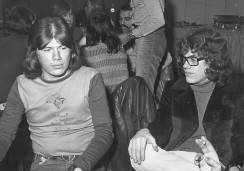
WKNR had a brother act.
Michael Stevens was at Keener 13 the same time as his brother Pat St. John, whose Hall of Fame career includes stops at CKLW, WPLJ, WCBS-FM and Sirius-XM.
Stevens went on to a long and successful career in public relations and promotions.
Enjoy Michael Stevens on WKNR (UNSCOPED) here. ![]()
Enjoy Michael Stevens on WKNR (SCOPED) here. ![]()
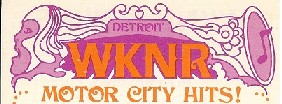
(The Tom Howard Collection)
Talent: SCOTT REGEN
Station: WCAR Detroit
Date: August 25, 1971
Time: Part 1 -
46:31 (unscoped)
Part
2 - 29:13 (unscoped)

WCAR seemed like an unlikely prospect for a rock station.
For years, owner Hy Levinson resisted the move to rock, sticking to what he called "good music" and not playing anything resembling rock 'n' roll. But with the station struggling financially, Levinson finally OKed the move to an adult contemporary format by 1970 with the slogan "W-CAR Cares About Detroit." By late 1971, WCAR had become a full Top 40 station as "All Hit Music, The Giant 1130" with a tight playlist and less talk by the deejays. A parade of formats would follow in the '70s, including all-news, progressive rock, adult contemporary (again) and then country as WCXI in 1979. The station switched format to sports and the call letters to WDFN in 1994.
This aircheck is from WCAR's first stab at an adult contemporary format, a few months before the switch to Top 40. Scott Regen had previously been in the Detroit market at CKLW and WKNR, and also jocked in Tampa, Miami and Kansas City. He returned to WKNR in late 1971, just in time for that station ending its Top 40 format the following spring.
Enjoy Scott Regen on WCAR, Part 1
(UNSCOPED) here. ![]()
Enjoy Scott Regen on WCAR, Part 2
(UNSCOPED) here. ![]()
(The Bill Dulmage Collection)
|
Talent: RON BRITAIN &
BOB DelGIORNO
Station: WIND Chicago
Date: September 1, 1971
Time: 59:00 (unscoped)
34:36
(scoped)
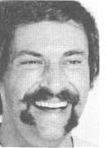
Ron Britain's radio career spanned 11 presidential administrations.
Britain's first radio gig was at WHAS Louisville in 1949, when Harry Truman was the 33rd president. He worked in radio throughout the entire second half of the 20th century, and into the 21st century as well when George Bush 44 occupied the White House. In between, he jocked at leading stations such as WSAI and WKRC Cincinnati, WHK Cleveland, KCMO Kansas City, WCFL, WIND, WJMK, WTMX, WLUP and WLS-FM Chicago. His last radio stop was WRLL "Real Oldies", a short-lived nostalgia station that also featured Chicago legends Tommy Edwards, Larry Lujack, "World Famous" Tommy Edwards, Scotty Brink and Jerry G. Bishop.
![]()
On this aircheck, you'll hear WIND's oldies format branded as "#1 Music" which began in the summer of 1971 and lasted until 1974. Britain, who chose his on-air name because of his love of all things English, was at WIND from 1970 to 1974. He was doing mornings when he left in March 1974. As for WIND, the station evolved into a mostly news-talk format by the end of the decade. On December 12, 1985 the station was sold and signed off with "The Whiffenpoof Song" and "The Star-Spangled Banner." WIND reappeared two weeks later with Spanish-language programming.
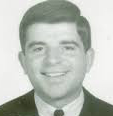
There's a little bit of Bob DelGiorno on the tail end of this aircheck. DelGiorno worked more than a half-century in radio, including 31 years at WWL New Orleans. He got his start in 1959 in his hometown of Syracuse, New York, also working in Fort Wayne, Indiana and Flint, Michigan.
Enjoy Ron Britain and Bob
DelGiorno on WIND (UNSCOPED) here. ![]()
Enjoy Ron Britain and Bob
DelGiorno on WIND (SCOPED) here. ![]()
(The Paul Wolski Collection)
|
Talent: HAL MARTIN
Station: CKLW Windsor, Ontario
Date: September 3, 1971
Time: 8:58
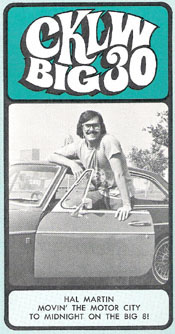
(Chart scan courtesy Tom Howard)
As a youngster, Michael Spears did magic - he was Texas State Champion Magician at age 15. But we remember him for the magic he made on the airwaves.
Magic? How about a 61 share in his night show at Gordon McLendon's KLIF in the late '60s - the highest in the history of the Dallas market. He was Hal Martin there, and he also used that name at Motor City powerhouse CKLW from 1969 to 1971.
More magic: in 1972, Spears was chosen by McLendon to launch Dallas FM station KNUS. The station was number-one within 90 days. After turning WSFO Tampa Bay into successful news-talk station WPLP in 1978, Spears returned to Dallas in 1982 to program K-104 FM. It also went to #1 for the first time.
For his efforts, Spears won Billboard's "Station of the Year" award three times, and twice won that publication's "Program Director of the Year" award. He was inducted into the Texas Radio Hall of Fame in 2004.
Spears also co-created "The Amber Plan," a radio alert system to aid in the search for missing children. In 2002, Spears won the Service to America award as bestowed by the National Association of Broadcasters.
All told, Spears consulted over 30 radio stations and groups in multiple formats, programming KHJ Los Angeles, KFRC San Francisco, WYSL Buffalo, New York, KKDA Dallas and WPNT Chicago. He produced literally hundreds of commercials and news segments for radio and television. Much in demand as public speaker and emcee, Spears was also a scuba diving and architecture enthusiast. He died of cancer October 25, 2005 at the age of 58.
Enjoy Michael Spears -
as Hal Martin - on CKLW here. ![]()
(The Tom Howard Collection)
For more great 'CK airchecks, visit The CKLW Years
Talent: JOHN RODE
Station: CHUM Toronto
Date: September
3, 1971
Time: 17:47
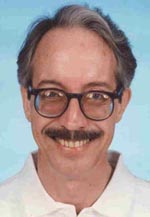
John Rode entertained at five different
Toronto stations, numerous outlets south of the border and even
did stints in Vancouver and Alaska. But he's probably best
remembered for the many years he spent at 1050 CHUM.
Rode arrived at CHUM in 1970 after a stint in
mornings at rival CKFH. Prior to that, the Wisconsin
native had appeared at several other stations, including WALT Tampa,
Florida, WKLO and WINN Louisville, Kentucky, WSAI Cincinnati, WRKO Boston, WIBG Philadelphia
and WDRC Hartford.
While Rode would spend much of the '70s, '80s and '90s at CHUM,
he gained everlasting fame in 1977 when he become the first
morning man at Q-107. He was also the morning
personality at CHUM-FM in the early '80s and KEY
590 (CKEY) late in the decade. Rode also found
time for 1970s stints at CFUN Vancouver and KFQD Anchorage,
Alaska. He returned to CHUM in 1989 for swing
work, often filling in on the morning show in the '90s.
Enjoy John Rode on CHUM here. ![]()
(The Gary J. Peterson and Donald Major Collections)
Audio editing by Marc Denis Productions
Talent: LARRY LUJACK
Station: WLS Chicago
Date: September 23, 1971
Time: 56:17 (unscoped)
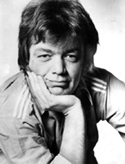
Sarcastic, grumpy, seemingly always on edge, Larry Lujack was the antithesis of the cheerful Top 40 jock. But he was also one of the most popular.
Lujack's caustic style was a hit with listeners who appreciated his cynical take on life. He was a pioneer of the shock jock genre later made popular by Howard Stern and others (Rush Limbaugh said Lujack was the only announcer he ever copied). Born Larry Blankenburg June 6, 1940 in Quasqueton, Iowa, he considered a career in wildlife conservatism but fell into radio when a part-time job at KCID in Caldwell, Idaho, turned into a full-time career. Lujack (he got his air name from Chicago Bears quarterback Johnny Lujack) worked at several other stations, including KJR Seattle and WMEX Boston, before landing in Chicago in 1967.
Lujack spent the next 20 years in the Windy City, doing two tours of duty each at Chicago Top 40 rivals WCFL and WLS. "Superjock" became a superstar in the highly competitive Chicago market - at his height he had a million listeners. His sardonic "Klunk Letter of the Day" and darkly humorous "Animal Stories" with sidekick Tommy Edwards became the stuff of legend.
Lujack was the last voice on WCFL when that station ceased Top 40 programming in March, 1976, then returned to WLS a few months later to begin a nine-year stint in mornings. In 1984, he signed a 12-year, $6-million contract with WLS, which made him one of the highest-paid announcers in the U.S. Lujack moved to afternoons a year later but left the air in the wake of declining ratings in 1987.
Lujack returned to Chicago radio in 2000-01 at WUBT, followed by his final Windy City stint at the short-lived WRLL from 2003 to 2006. He died December 18, 2013 in New Mexico after a year-long battle with esophageal cancer. The 2004 National Radio Hall of Fame inductee was 73.
Enjoy Larry Lujack on WLS here. ![]()
(The Don Shuttleworth Collection)
|
Talent: RICK JANSSEN
Station: CHLO London, Ont.
Date: October 4, 1971
Time: 1:01:15 (unscoped)
The Top 40 wars in London, Ontario, heated up in the early '70s, with CJOE going after the well-established CHLO for hit music ears in the Forest City.
CJOE, a Beautiful Music outlet since signing on in 1965, dipped its toe into Top 40 in 1970 by playing rock in the evenings with an emphasis on "underground" or album music. CHLO countered by playing more album cuts, then CJOE fought back by going rock full-time and mixing album cuts with Top 40 tunes. This aircheck of Rick Janssen from the fall of 1971 gives you an good idea of what CHLO was doing to counter the CJOE threat at the time.
Enjoy Rick Janssen on CHLO here. ![]()
(The Charlie Ritenberg Collection)
Talent: DAVID S. ARROWOOD
Station: WIFC Wausau, Wis.
Date: October 5, 1971
Time: 30:22
(unscoped)
10:42 (scoped)

No Top 40 on FM? That's the way it was entering the second half of the 1960s.
Changing all that was a 1964 FCC edit forcing FM stations to devote at least 12 hours of original content every day, apart from their AM parent. This opened the door for so-called freeform radio, which featured deep album cuts from rock acts that AM stations would'nt touch. Before long programmers got the idea to put the Top 40 format on FM - the same songs, the same presentation, but now in stereo.
An early convert to this format was WIFC, which in August 1969 switched from Beautiful Music to Top 40. In 1971, they were celebrating their second anniversary as a hit parade station. David S. Arrowood was music director, and also appeared on air at the Big 95.5.
Enjoy David S. Arrowood on
WIFC (UNSCOPED) here. ![]()
Enjoy David S. Arrowood on
WIFC (SCOPED) here. ![]()
(The Don Shuttleworth Collection)
Talent: PETE GRIFFIN and
DAVID PRITCHARD
Station: CHUM-FM Toronto
Date: October 21, 1971
Time: 13:36
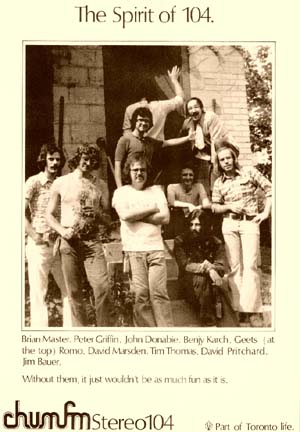
(Courtesy John Donabie)
(Larger view here)
It was a different time.
A time when announcers programmed their own music. A time when a song was played because the deejay or music director - or even the listeners - liked it, not because some focus group thousands of miles away "approved it". A time when you could hear a rock tune, a jazz piece, a classical opus, and maybe some folk music all in the same set. A time of long music sets, rather than lengthy commercial sets.
It was a time when announcers just talked to the audience - one-on-one - rather than regurgitating liner notes. A time when one skilled communicator could carry an entire show, rather than a team of self-described "zany" types known as a "Morning Zoo." A time of intelligent rap and gentle wit, rather than shouting. A time when there was an actual living and breathing person in the studio all the time, not a machine. A time when stations were programmed locally, not from head office.
This was progressive rock radio in its early days. Back in the late '60s, this new brand of radio emerged - one that broke all the rules. And one of the first stations to program this "album rock" format - some called it "underground" radio - was Toronto's CHUM-FM. Debuting on July 1, 1968 it was truly memorable in its early days, playing album cuts not heard anywhere else and with outstanding personalities like Pete Griffin, Walter Michaels, Larry Green, Tim Thomas, Kim Calloway, Hugh Currie, David Pritchard, Benji Karsh, Reiner Schwartz, Dave Marsden and John Donabie.
Pritchard was CHUM-FM's all-night man in the early years of that station's progressive rock format. He later went on to become program director of yet another legendary progressive rock station, Toronto's CFNY. His death on February 27, 2005 was sad news for all of those who remembered him, either on or off the air.
On October 21, 1971, Pritchard hung around after his shift to talk on-air to CHUM-FM morning man Pete Griffin.
You can hear the results here. ![]()
(The
Gary Pfieffer Collection)
Talent: JACK ARMSTRONG
Station: WKBW Buffalo, N.Y.
Date: November, 1971
Times: Part 1 -
59:43 (unscoped)
Part 1 - 14:02 (scoped)
Part 2 - 41:14 (unscoped)
Part 2 - 10:06 (scoped)
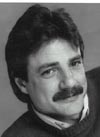
Rarely do all the elements that made Top 40 radio so memorable
come together as they do on this aircheck.
First, there's the jock. Jack Armstrong is without question one of the best Top 40 jocks of all time - some would say THE best (they'd get no arguments from us.) By the time he arrived at 'KB in 1971, Armstrong had already appeared on several Top 40 giants, including WKYC, WMEX, WIXY, CHUM and WPOP. And there were plenty more to come. But we believe Jack shone brightest at 'KB - the combination of energy and enthusiasm he displayed there is without peer.
As for the station, 'KB's consistently epitomized the excellence that was Top 40 radio from its launch as FutureSonic Radio in 1958, to its end as a locally-programmed music station in 1988. 'KB might have at its very best during the Jeff Kaye years, from 1966 to 1973, and this aircheck shows why.
The jingles are fabulous (how
about those Pop-Tops!), the music outstanding, the
presentation tight and bright ... need we say more? If you're
wondering why we love classic Top 40 radio, just listen.
Enjoy Part One of Jack
Armstrong on 'KB (UNSCOPED) here. ![]()
Enjoy Part One of Jack
Armstrong on 'KB (SCOPED) here. ![]()
Enjoy Part Two of Jack
Armstrong on 'KB (UNSCOPED) here. ![]()
Enjoy Part Two of Jack
Armstrong on 'KB (SCOPED) here.![]()
(The Don Shuttleworth Collection)
|
Talent: JOHNNY WILLIAMS
Station: KHJ Los Angeles
Date: November 26, 1971
Time: 13:22
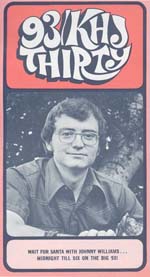
(KHJ Chart/December 21, 1971)
Johnny Williams outlasted
them all at KHJ.
When KHJ debuted Boss Radio in April, 1965, the
lineup was Robert W. Morgan (6-9 a.m.), Roger
Christian (9 a.m.-noon), Gary Mack (noon-3
p.m.), The Real Don Steele (3-6 p.m.), Dave
Diamond (6-9 p.m.) and Sam Riddle (9
p.m.-midnight) and Williams (midnight-6 a.m.).
One by one the originals left. Diamond was the first to go, just a couple of months after the launch. Christian went in 1966, Mack left in 1967, Riddle departed in 1970 and Steele said goodbye in 1973. Morgan left KHJ in 1970, returned in 1972 and departed for good in 1973. That left Williams as the last of the original Boss Jocks, and he finally departed in the fall of 1974.
Williams started in radio in 1959 at KBOL Boulder, Colorado. He jocked at KIMN and KBTR Denver, KISN Portland, Oregon, WABB Mobile, Alabama, KRIZ Phoenix, KCBQ San Diego, KRLA Los Angeles and a few others before arriving at KHJ in the spring of 1965. After KHJ, he went to WTAE Pittsburgh for a decade beginning in 1975. Williams was in Honolulu radio in the 1990s at KHVH and KHNR before launching one of the first radio web sites, 440:Satisfaction, in 1995 (he gave us our first link in 1996!)
Hear Johnny Williams on KHJ here. ![]()
(The Tom Howard Collection)
Talent: LEE MURRAY
Station: CKGM Montréal
Date: December 28, 1971
Time: 30:23
(unscoped)
4:04
(scoped)
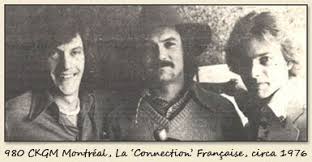
The climb to number-one was short and sweet for CKGM in the early 1970s.
CKGM signed on December 7, 1959 and was a hit music station in the 1960s. But things really took off for the Montréal station after it revamped its format January 1, 1970. By December of that year CKGM had overtaken rival 1470-CFOX to become the number-one rocker in Montréal. It would hold that position until December 1979, when it was overtaken by sister station CHOM-FM.
Lee Murray - whose birth name was Murray Cruchley - jocked at CKGM from 1971 to 1973. He moved to CFUN Vancouver circa 1974.
Enjoy Lee Murray (UNSCOPED) here. ![]()
Enjoy Lee Murray (SCOPED) here. ![]()
(The Bill Dulmage Collection)
Talent: LARRY DOUGLAS
Station: CJOE London, Ontario
Date: December
30, 1971
Time: 1:04:36
(unscoped)
19:20 (scoped)

How many of you learned their radio chops on the weekend all-night show?
Like many a young jock in the days of live all-night jocks, Larry Douglas is learning the ropes on this aircheck from the second-last day of 1971. Douglas plays an interesting assortment of music - from Humble Pie to Helen Reddy to Isaac Hayes. We love the anti-drug ads. But what's with all the Can-Con? The Stampeders, the Five Man Electrical Band, Lighthouse - hey Larry you don't need to play Canadian content between midnight and 6 a.m.! It doesn't count toward the quotas. Maybe he just likes the music!
Enjoy Larry Douglas on CJOE from
December 30, 1971 (UNSCOPED) here. ![]()
Enjoy Larry Douglas on CJOE from
December 30, 1971 (SCOPED) here. ![]()
(The Charlie Ritenburg Collection)
Talent: RON O'BRIEN
Station: WCAR Detroit
Date: December 31, 1971
Time: 54:01 (unscoped)
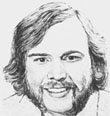
Big Ron O'Brien hosted a show called "On the Radio" in the '80s and '90s, fitting for a guy who was on the air his entire adult life.
Born Richard Walls in Des Moines, Iowa, O'Brien started his professional career in 1969 in nearby Kansas City. His 49-year career took him all over the continental U.S., as far west as Los Angeles (KFI and KIIS), as far east as Boston (WRKO) as far north as Milwaukee (WOKY) and his southernmost stop, WQXI Atlanta. His resume also includes such biggies as KTLK in Denver, WCFL in Chicago, WPGC in Washington, D.C. and a trio of Philadelphia stations, WFIL, WYXR-WLCE Philadelphia and the station where he spent the last six years of his life, WOGL.
Ron O'Brien died April 27, 2008 of pneumonia at the age of 56.
Enjoy Ron O'Brien on WCAR here. ![]()
(The Bill Dulmage Collection)
|